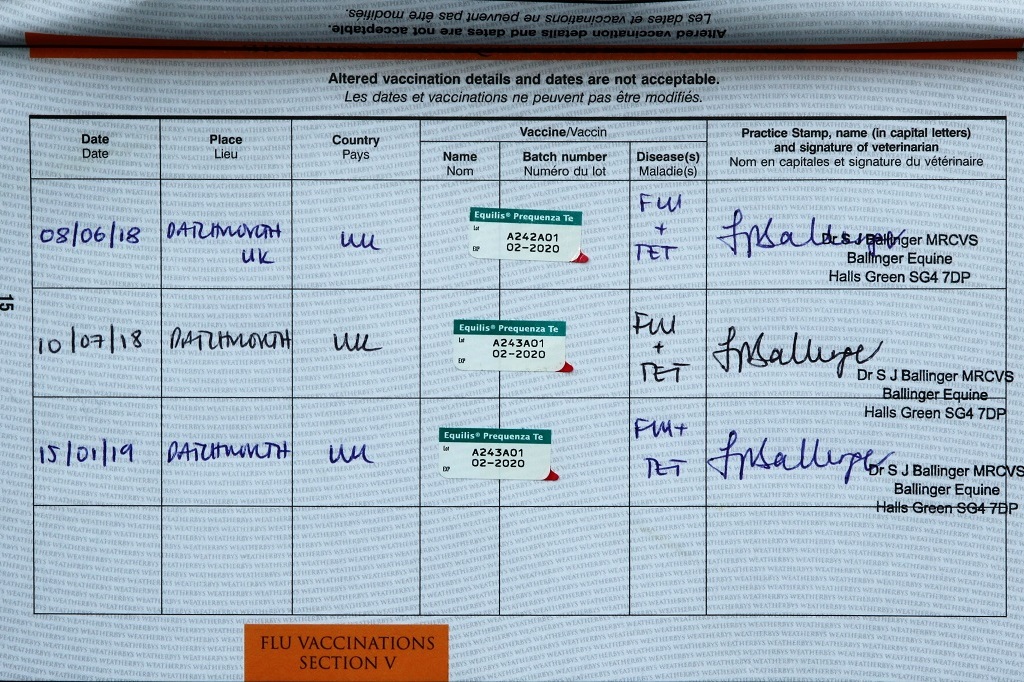
To date in 2019 there have been several confirmed outbreaks of equine influenza across Europe. And as many horse and pony owners in our region will already be aware, there is currently an outbreak of equine influenza (EI) in Essex. Essex lies within our practice area and we want to raise awareness of the disease and the risk it presents to the local equine population.
Equine Influenza is endemic in the national herd
EI is a viral infection which causes respiratory disease. It is endemic in the UK national herd, so it is not unlikely horses will come into contact with the virus.
Symptoms of EI include running a high temperature for several days, clear discharge from the nose and eyes, a dry harsh cough, lethargy and swollen lymph nodes (glands). The nasal discharge turns to green or yellow if there is a secondary bacterial infection which develops in the already immunocompromised, sick animal. In cases of EI, the mucosa in the respiratory tract is seriously affected and it is important this is allowed to heal prior to resumption of exercise. It takes between 50 to 100 days after infection for the respiratory tract to recover and exercise must be limited during this period. EI is rarely fatal but it is highly contagious and disrupts training and competition schedules.
It is important to bear in mind that in compromised animals, pneumonia and death can occur. As with many such infections, risk factors include concurrent injury or illness, including Equine Cushings Disease (Pituitary Pars Intermedia Dysfunction (PPID)) and COPD/dust allergies. Younger and older animals are also particularly vulnerable to infection.
Treatment is symptomatic and supportive and includes medication for the fever and any secondary infections. Rest is vital and premature return to exercise can compromise the respiratory tract causing potential long-term complications.
Transmission of EI is by contact with the virus, either by infected horses via the air or by mechanical transmission via clothes, tack, tools etc. It is highly contagious, and with a short incubation period, signs of infection exhibit as quickly as 2 days after initial exposure. Horses remain infectious for up to 10 days following symptoms even if they appear to be clinically improved in themselves. This virus spreads rapidly through an equine population and there is usually a 100% infection rate.
As everyone knows, vaccination for equine influenza is effective in limiting spread of the virus and decreasing the severity of infection if exposure occurs. Also, if infection does occur, vaccinated horses shed less virus in their nasal secretions.
So, what do you need to do? Check your horse, pony or donkey is up-to-date with equine influenza vaccinations. The primary course of three injections is essential to ensure protection and subsequent booster vaccines are required within 365 days each year (in the case of current FEI competition rules, an influenza vaccine should be administered within 6 months and 21 days of competition). If you feel your horse or pony is at greater risk, more frequent vaccination will provide increased protection. Vaccines may be administered in the face of an outbreak, but it is important that the horse is clinically well when vaccinated. Even if your horse or pony never leaves the yard, there is still risk of exposure especially if any other animals on the yard compete or hack out.
Equine influenza vaccinations are an insurance policy and provide protection to severe infection from EI. If your horse or pony is not currently up to date with vaccinations, we recommend you get in touch with the office on 01462 414008 or via the online appointment booking form to arrange a vaccination visit.
Please do get in touch with us if you would like clarification or any advice about vaccinations.






